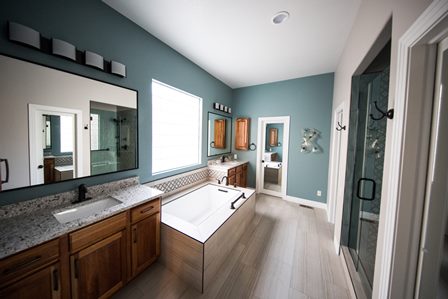
Photo by Christa Grover
I was emailed an article that was filled with so much misinformation,(virtually every single sentence in it), that I decided to use the article’s erroneous contents as a “teachable spring board” instead of just being disgusted by what passes as Feng Shui tips by unqualified sources.
The misguided author puts forth an argument that bathrooms represent water and that this can somehow correlate with a person feeling like they are “drowning” in some part of their life. First of all, most people do not spend enough time in their bathroom for it to be considered a major influence on one’s life. Other areas, such as a bedroom or home office or living room carry much more impact on a person’s well-being. If a person spends an excessive amount of time in their bathroom, the reasons for that may not have anything to do with Feng Shui.
Next, even though the bathroom contains a toilet with some water in it, I wouldn’t call this an overwhelming amount of water. Nor should anyone be concerned with the water that enters the bathroom briefly when showering or using the sink. This is an example of someone really not understanding Five Element Theory. In fact, the majority of hard surfaces in a bathroom (like tile and porcelain) are the earth element. There is no need to be concerned about a bathroom representing too much water, but if there were, all the earthen surfaces would “control” the water. In the cycle of the Elements, Earth blocks or dominates water.
The misguided author continues to state that mirrors are water and should be removed from a bathroom. First of all, a mirror may reflect like water, but they are more the metal element than any other element, especially ones with a silver backing. The original mirrors from centuries ago were made of polished brass or bronze and the bathroom is one of the BEST locations for mirrors. Often, people have sleep disturbances when mirrors are in a bedroom, so one of the next most convenient locations for mirrors is right in the bathroom.
The misguided author continues to state that other metallic fixtures like faucets and metal towel racks be removed from the bathroom! This is so outrageous and ridiculous; I wonder if the misguided author thinks that using an Outhouse in the backyard would be “better” Feng Shui.
As the article gets more and more delusional, the misguided author states that crystals placed in the bathroom are representative of water and should be removed too. I think that even a young child will recognize that crystals (like rose quartz or amethyst) are stones, rocks, in other words the earth element. Not water.
More bad advice rounds out the erroneous article by stating that bathrooms should not be blue in color because that is yet more water. This is another example of someone being clueless in regards to Five Element Theory. In authentic Feng Shui practices, we can determine a range of good colors for any room in the house, including the bathroom, based on the unique features such as year built, compass reading, and the location of the bathroom within the unique floor plan. There are no fixed good or bad colors.
In fact, if we just consider normal color psychology, blue is well-known to be a relaxing color. Without being graphic, this would be a welcome influence for many people using the bathroom. The misguided author then suggests that the way to “decrease” the water energy of a bathroom is with fire and she recommends red color for the bathroom. In Five Element Theory, it is actually water which controls fire, not the other way around: another hefty example of an author with apparently no training whatsoever in authentic Feng Shui.
The closer to the article, encourages people to de-clutter their bathrooms, which is ironic since the bathroom might be the one area that is usually NOT overly cluttered when a person has clutter issues in other parts of the house. The misguided author wants you to de-clutter your bathroom so you can sell your stuff on Amazon, like her. Wow. Interior designers are justified in their frustrations and skepticism about Feng Shui when they encounter such impractical nonsense and rigid notions about design and decor, masquerading as Feng Shui.
Author: Kartar Diamond
Company: Feng Shui Solutions (R) Since 1992
From the Myths and Misinformation Blog Series
